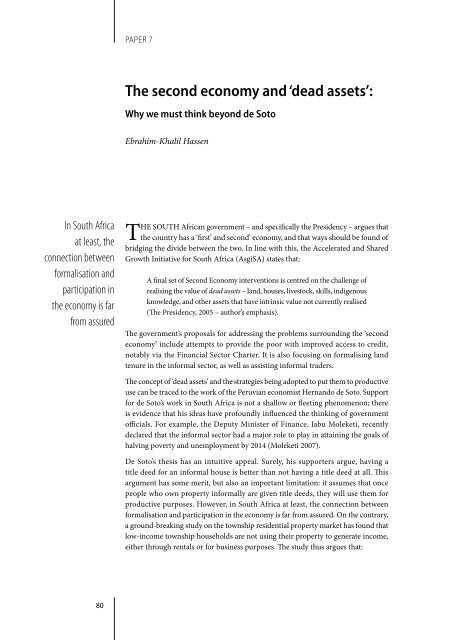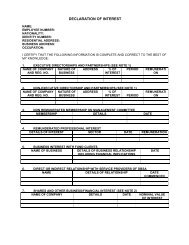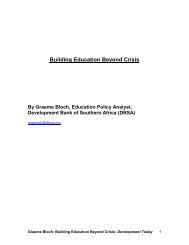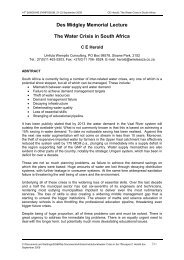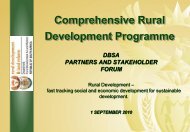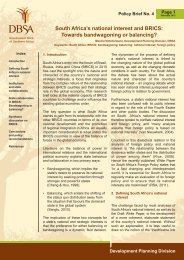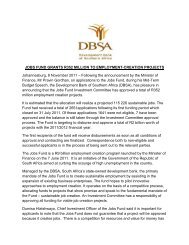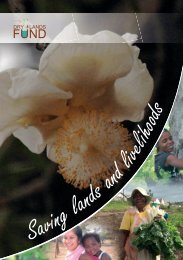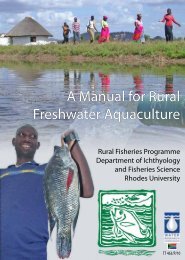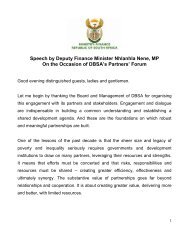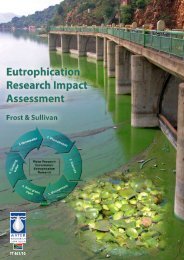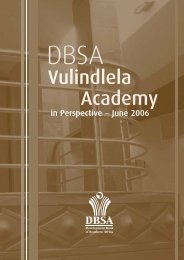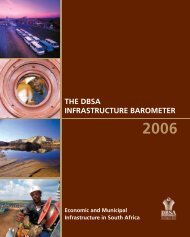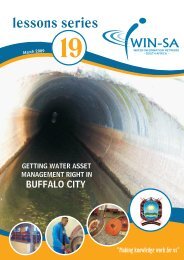Are Hernando de Soto's views appropriate to South Africa?
Are Hernando de Soto's views appropriate to South Africa?
Are Hernando de Soto's views appropriate to South Africa?
Create successful ePaper yourself
Turn your PDF publications into a flip-book with our unique Google optimized e-Paper software.
Paper 7<br />
The second economy and ‘<strong>de</strong>ad assets’:<br />
Why we must think beyond <strong>de</strong> So<strong>to</strong><br />
Ebrahim-Khalil Hassen<br />
In <strong>South</strong> <strong>Africa</strong><br />
at least, the<br />
connection between<br />
formalisation and<br />
participation in<br />
the economy is far<br />
from assured<br />
THE <strong>South</strong> <strong>Africa</strong>n government – and specifically the Presi<strong>de</strong>ncy – argues that<br />
the country has a ‘first’ and second’ economy, and that ways should be found of<br />
bridging the divi<strong>de</strong> between the two. In line with this, the Accelerated and Shared<br />
Growth Initiative for <strong>South</strong> <strong>Africa</strong> (AsgiSA) states that:<br />
A final set of Second Economy interventions is centred on the challenge of<br />
realising the value of <strong>de</strong>ad assets – land, houses, lives<strong>to</strong>ck, skills, indigenous<br />
knowledge, and other assets that have intrinsic value not currently realised<br />
(The Presi<strong>de</strong>ncy, 2005 – author’s emphasis).<br />
The government’s proposals for addressing the problems surrounding the ‘second<br />
economy’ inclu<strong>de</strong> attempts <strong>to</strong> provi<strong>de</strong> the poor with improved access <strong>to</strong> credit,<br />
notably via the Financial Sec<strong>to</strong>r Charter. It is also focusing on formalising land<br />
tenure in the informal sec<strong>to</strong>r, as well as assisting informal tra<strong>de</strong>rs.<br />
The concept of ‘<strong>de</strong>ad assets’ and the strategies being adopted <strong>to</strong> put them <strong>to</strong> productive<br />
use can be traced <strong>to</strong> the work of the Peruvian economist <strong>Hernando</strong> <strong>de</strong> So<strong>to</strong>. Support<br />
for <strong>de</strong> So<strong>to</strong>’s work in <strong>South</strong> <strong>Africa</strong> is not a shallow or fleeting phenomenon; there<br />
is evi<strong>de</strong>nce that his i<strong>de</strong>as have profoundly influenced the thinking of government<br />
officials. For example, the Deputy Minister of Finance, Jabu Moleketi, recently<br />
<strong>de</strong>clared that the informal sec<strong>to</strong>r had a major role <strong>to</strong> play in attaining the goals of<br />
halving poverty and unemployment by 2014 (Moleketi 2007).<br />
De So<strong>to</strong>’s thesis has an intuitive appeal. Surely, his supporters argue, having a<br />
title <strong>de</strong>ed for an informal house is better than not having a title <strong>de</strong>ed at all. This<br />
argument has some merit, but also an important limitation: it assumes that once<br />
people who own property informally are given title <strong>de</strong>eds, they will use them for<br />
productive purposes. However, in <strong>South</strong> <strong>Africa</strong> at least, the connection between<br />
formalisation and participation in the economy is far from assured. On the contrary,<br />
a ground-breaking study on the <strong>to</strong>wnship resi<strong>de</strong>ntial property market has found that<br />
low-income <strong>to</strong>wnship households are not using their property <strong>to</strong> generate income,<br />
either through rentals or for business purposes. The study thus argues that:<br />
80


